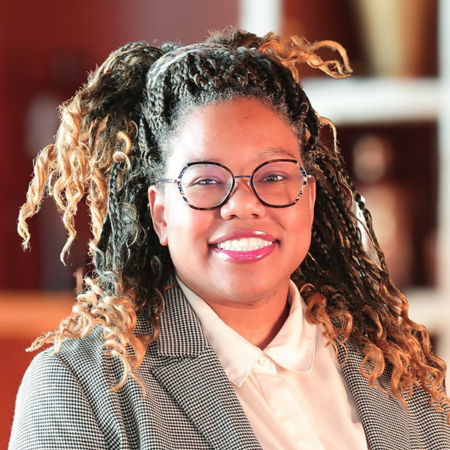By Brittany Reese
Civic Arkansas is the Institute’s collaborative initiative to improve Arkansas’s civic health, with a focus on building pathways for connectedness and strengthening local communities. The program flourishes through a dynamic network of civic leaders known as Civic Activators, who unite communities across the state to address local challenges through collaborative problem solving.
Kristin Higgins and Arkansas Public Policy Center


Kristin Higgins has worked at the Arkansas Public Policy Center at the University of Arkansas System Division of Agriculture since 2012, following a decade in journalism covering Arkansas government and crime. She helps lead one of the nation’s few Extension ballot issue education programs, providing nonpartisan information on proposed amendments and state laws. Higgins holds a master’s degree in agricultural education.
The Public Policy Center (PPC), established in 2004, is at the Cooperative Extension Service state office in Little Rock. Higgins explained that part of the center’s work began in response to a proposed constitutional amendment to eliminate the property tax, which would have affected every Arkansan.
“We wanted people to have the information they needed to make an informed decision,” she said. “The Arkansas Supreme Court ended up striking the citizen initiative from the ballot, so no vote was cast on the proposal.”
Using research-based education, the center breaks down complex topics, often involving multiple perspectives and wide-reaching impacts, so that citizens can stay informed about public issues.
Voter Guide and Other Services

The PPC takes two approaches: collaborating with partners to conduct facilitations and research, as well as creating materials for the general public. Its role is a neutral mediator, providing historical context and factual information without advocacy.
“We put out the Arkansas Ballot Issues Guide every election cycle when there’s a constitutional amendment on the ballot,” Higgins said.
The center’s voter guide includes statewide ballots and allows voters to review each proposal’s official ballot title, a section of questions and answers, and viewpoints from both supporters and opponents.
Higgins explained that research has shown that voters tend to skip ballot issues because they feel they don’t have enough information to decide and prefer to vote “no” or skip the question to preserve the status quo.
“The voter guide helps people participate in policy making that affects Arkansans for decades, if not longer,” she said.
The guide, which is available at all 75 county extension offices, is the only neutral source for ballot issues in Arkansas. It’s released in the fall every two years, with the next guide available in 2026. The center printed over 48,000 copies of its voter guide in 2024 and attracted 371,867 page views of the voter information on its website between Sept. 1 and Nov. 11, 2024.
“We have external reviews of the guide by a University of Arkansas Law School professor, and have supporters and opponents review the guide to ensure the correct information is provided,” she said.

The PPC also offers information about county official roles and Arkansas Re-Entry Simulation services, and has co-hosted Jail Resource Day for four years.
Recent Focus Areas
Higgins takes a thoughtful approach to public communication, focusing on clarity, accessibility, and civic engagement. She works to make complex issues understandable and relevant, helping people catch up on topics that might otherwise feel distant.
During the 2020 U.S. Census, the center focused on explaining what it is, how to participate, and why it matters, especially for Arkansans. Higgins highlighted how census data affects funding, representation, and planning.
Her work also involved breaking down the redistricting process, showing how it works in Arkansas and why it matters to everyday citizens. By simplifying complex topics, she encourages more people to engage in democracy.
Through her work at the center, Higgins shows how strong communication can connect policy with public understanding, ensuring important issues are seen, understood, and acted on.
Environmental Impact
For more than a decade, the PPC has been deeply involved in facilitating meaningful conversations around environmental issues in Arkansas. The center’s work includes partnering with the Arkansas Natural Resources Commission to engage communities on the topic of water pollution and runoff.
The PPC helped bridge the gap between the state agency and individuals who cared about the issue, whether they were professionals working to reduce pollution or everyday property owners curious about what they could do to help.
The center’s approach was rooted in accessibility and connection, ensuring that technical topics like runoff pollution were explained in ways that made sense to the public.
She emphasized that pollution isn’t always the result of someone dumping waste directly into a waterway. Often, it’s more subtle—like rainwater running off a field or backyard, carrying fertilizers, chemicals, or other pollutants into nearby streams and rivers.
By creating space for dialogue and education, Higgins helped communities understand their role in protecting natural resources and empowered them to take action.
How the Center Helps Arkansans

Higgins explained that Arkansas has low voter participation, and one way to increase civic engagement and voter participation is to better explain complex ideas.
Higgins recalled overhearing a conversation in which people were asking each other questions about constitutional amendments, just two minutes after one of them had voted. One person asked, “What are we voting on?”
She emphasized that what people see on the ballot isn’t the full policy; it’s just the title, which can be misleading.
“Arkansans are curious. They want answers to their questions and thankfully they trust us to provide those answers.”
PPC supports rural and underserved communities in Arkansas
Being part of the Cooperative Extension Service means the center has the capacity to reach people in all 75 counties. There’s not a county that goes unreached.
Higgins also said the PPC is working to put information into multiple languages and has already partnered with a state library system to translate resources into Spanish to expand the reach of election and voter information.
Higgins’ master’s thesis evaluated the center’s voter education. She wanted to know who we were reaching and who we weren’t reaching. She found that we were reaching older, white, educated women.
She questioned, “So how do we improve upon that to reach more than older, educated white women?” This led the PPC to work with the Hispanic Women Organization of Arkansas.
How People Can Get Involved
The PPC’s engagement is often issue-driven and flexible. The public can stay informed about the center by subscribing to its monthly newsletter and getting involved by sharing their local and special election information. Higgins said this helps the center build a statewide database.
Most of the PPC’s outreach focuses on creating and sharing information.
“There isn’t a central location for local special elections, so we’ve been collecting and sharing local election information on our blog as another way to get the word out and empower voters. Higgins said people can help by sharing information with others in their community.
Higgins also suggested that people connect with the center in several ways.
You can request ballot issue education programs by contacting your local county extension agent or the Public Policy Center at 501-671-2160.
Arkansans can also email the center at publicpolicycenter@uada.edu and visit its social media pages on Facebook, LinkedIn, and Bluesky.
Higgins gives the following advice to people who want to make a difference in their community through public policy:
- Avoid misinformation by thinking critically about sources.
- Observe local government (e.g., city councils and school boards).
- Collaborate with existing organizations rather than duplicating efforts.
- Network with other people in your community.
- Use your voice and identify gaps where you can contribute.

